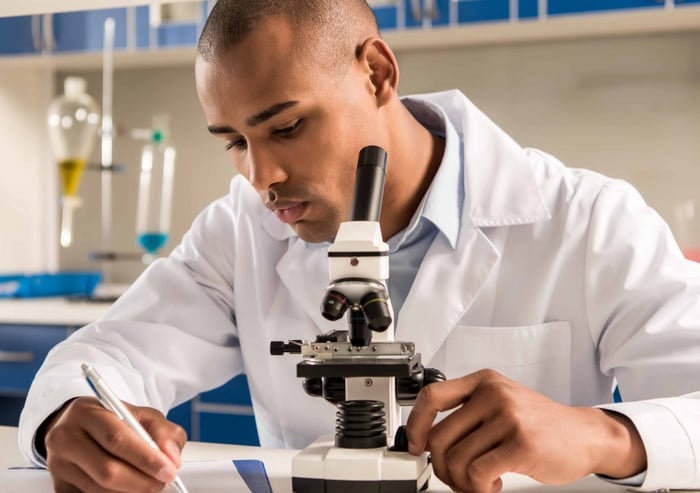- About
- Academics
- Admissions & Aid
- Life
- Research
- News & Events
Program at a Glance
EXPLORE THE MAKEUP OF MATTER AND ITS UNIVERSAL ELEMENTS
Department
The mission of the Department of Chemistry is to educate students in the chemical sciences and the governing scientific principles, along with the safe practice of chemistry, to become well-versed scientists and healthcare professionals.
Learn More
Bachelor of Science in Chemistry
Chemistry offers a bachelor of science degree in chemistry and a dual degree consisting of the B.S. in chemistry and the bachelor of chemical engineering degree through the Atlanta University Consortium Dual-Degree Enrollment Program.
Learn More
About Chemistry
-
Overview

MOREHOUSE CHEMISTRY STUDENTS APPLY CENTRAL SCIENTIFIC METHODS TO MASTER THE ELEMENTS.
Chemistry students receive rigorous preparation for the pursuit of graduate studies in chemistry or careers as professional chemists. Each student is exposed to considerable biology, physics, and mathematics to prepare them for today’s technological marketplace, where interdisciplinary inquiry is essential. As a result, many chemistry majors complete the requirements for a minor in mathematics, biology, or physics as well.
The Morehouse College program also provides quality service courses for majors in related life and physical science programs. These service courses bear no distinction from the program’s courses for majors.
-
Outcomes

Outcomes
Chemistry majors are competent in basic laboratory skills such as safe practices, keeping a notebook, use of electronic balances and volumetric glassware, preparation of solutions, chemical measurements using pH electrodes and spectrophotometers, data analysis, and report writing.
- Define problems clearly, develop testable hypotheses, design and execute experiments, analyze data, and draw appropriate conclusions
- Demonstrate knowledge of the use of modern scientific instrumentation and the methods of computational chemistry
- Present information in a clear and organized manner, write well-organized and concise reports in a scientifically appropriate style, and use appropriate technology such as poster preparation software, word processing, chemical structure drawing programs, and computerized presentations in their communication
- Describe the impact of international concerns such as climate change and rapid environmental degradation; articulate the important contributions of scientists from other countries in the development of models, theories and research in chemistry; and describe the important concerns and factors regarding the international spread of disease and pandemics
-
Earn the Major
Curriculum
Major Course of Study Requirements
Chemistry offers a bachelor of science degree in chemistry and a dual degree consisting of the B.S. in chemistry and the bachelor of chemical engineering degree through the Atlanta University Consortium Dual-Degree Enrollment Program.
All students begin with a one-year course sequence that engages students in the competencies needed for the practice of chemistry as a modern science. In subsequent terms, students are expected to complete both introductory and in-depth coursework in the five sub-disciplines of modern chemistry: analytical chemistry, organic chemistry, physical chemistry, bio and biophysical chemistry, and inorganic chemistry. In addition, one advanced elective course in chemistry is also required.
In addition to these major core requirements, students are expected to complete cognate courses, which include introductory coursework in English, biology, physics, and mathematics. Lastly, two in-depth elective courses in cognate science areas beyond these introductory courses are also required.
General Education (Core)
33-48 hours
Refer to the general education requirements for more information.Chemistry Major
68-71 hours- HCHE 111— General Chemistry Lecture
- HCHE 111L— General Chemistry Lab
- HCHE 112— General Chemistry Lecture
- HCHE 112L— General Chemistry Lab
- HCHE 211— Analytical Chemistry Lecture
- HCHE 211L— Analytical Chemistry Lab
- HCHE 231— Organic Chemistry Lecture
- HCHE 231L— Organic Chemistry Lab
- HCHE 232— Organic Chemistry Lecture
- HCHE 232L— Organic Chemistry Lab
- HCHE 321— Physical Chemistry Lecture
- HCHE 321L— Physical Chemistry Lab
- HCHE 322— Physical Chemistry Lecture
Choose one course from the list below:
- HCHE 327— Introduction to Polymer Chemistry
- HCHE 422— Chemical Instrumentation
- HCHE 423— Advanced Physical Chemistry I
- HCHE 424— Advanced Physical Chemistry II
- HCHE 435— Introduction to Space Science
- HCHE 437— Instrumental Methods in Atmospheric Chemistry
- HCHE 471— Advanced Organic Chemistry I
- HCHE 471— Advanced Organic Chemistry II
- HCHE 322L— Physical Chemistry Lab
- HCHE 326— Biophysical Chemistry Lecture
- HCHE 326L— Biophysical Chemistry Lab
- HCHE 421— Inorganic Chemistry Lecture
- HCHE 421L— Inorganic Chemistry Lab
- HMTH 161— Calculus I
- HMTH 162— Calculus II
- HMTH 271— Linear Algebra
- HPHY 154— Mechanics
- HPHY 253— Electricity and Magnetism
- HBIO 111— General Biology
- HBIO 113— Comprehensive Biology
Choose two courses from the list below:
- HMTH 255— Theory of Sets
- HMTH 263— Calculus III
- HMTH 321— Ordinary Differential Equation
- HPHY 254— Optics and Modern Physics
- HPHY 253— Electricity and Magnetism
- HBIO 251— Cell Biology

MOREHOUSE CHEMISTRY STUDENTS APPLY CENTRAL SCIENTIFIC METHODS TO MASTER THE ELEMENTS.
Chemistry students receive rigorous preparation for the pursuit of graduate studies in chemistry or careers as professional chemists. Each student is exposed to considerable biology, physics, and mathematics to prepare them for today’s technological marketplace, where interdisciplinary inquiry is essential. As a result, many chemistry majors complete the requirements for a minor in mathematics, biology, or physics as well.
The Morehouse College program also provides quality service courses for majors in related life and physical science programs. These service courses bear no distinction from the program’s courses for majors.

Outcomes
Chemistry majors are competent in basic laboratory skills such as safe practices, keeping a notebook, use of electronic balances and volumetric glassware, preparation of solutions, chemical measurements using pH electrodes and spectrophotometers, data analysis, and report writing.- Define problems clearly, develop testable hypotheses, design and execute experiments, analyze data, and draw appropriate conclusions
- Demonstrate knowledge of the use of modern scientific instrumentation and the methods of computational chemistry
- Present information in a clear and organized manner, write well-organized and concise reports in a scientifically appropriate style, and use appropriate technology such as poster preparation software, word processing, chemical structure drawing programs, and computerized presentations in their communication
- Describe the impact of international concerns such as climate change and rapid environmental degradation; articulate the important contributions of scientists from other countries in the development of models, theories and research in chemistry; and describe the important concerns and factors regarding the international spread of disease and pandemics
Curriculum
Major Course of Study Requirements
Chemistry offers a bachelor of science degree in chemistry and a dual degree consisting of the B.S. in chemistry and the bachelor of chemical engineering degree through the Atlanta University Consortium Dual-Degree Enrollment Program.
All students begin with a one-year course sequence that engages students in the competencies needed for the practice of chemistry as a modern science. In subsequent terms, students are expected to complete both introductory and in-depth coursework in the five sub-disciplines of modern chemistry: analytical chemistry, organic chemistry, physical chemistry, bio and biophysical chemistry, and inorganic chemistry. In addition, one advanced elective course in chemistry is also required.
In addition to these major core requirements, students are expected to complete cognate courses, which include introductory coursework in English, biology, physics, and mathematics. Lastly, two in-depth elective courses in cognate science areas beyond these introductory courses are also required.
General Education (Core)
33-48 hours
Refer to the general education requirements for more information.
Chemistry Major
68-71 hours
Choose one course from the list below:
|
Choose two courses from the list below:
|
MEET OUR FACULTY & STAFF
The Chemistry department is located in Merrill Hall. Please find us in the 1st floor office suite (Merrill 105A).
Lance Shipman Young, MPH, PhD., Associate Professor and Chair
Brian M. Lawrence, PhD, Associate Professor and Associate Chair

Brian M. Lawrence
Associate Professor

Juana Mendenhall
Professor

Arkajyoti Sengupta
Assistant Professor

Lance Young
Associate Professor/Department Chair, Chemistry
